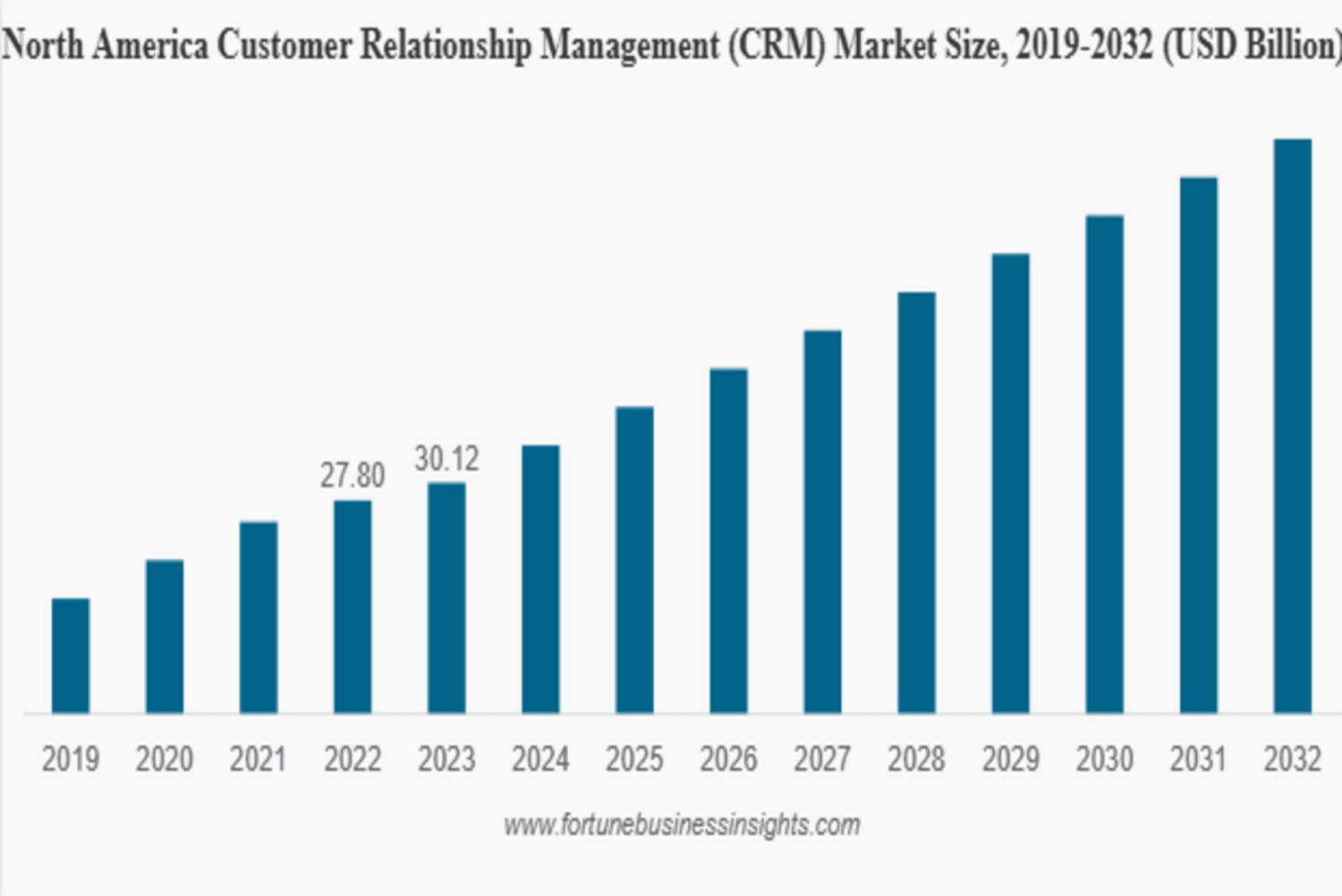5 Common Misconceptions About CRM Marketing You Should Know

Want to gain a serious edge over your competitors? Understanding your customers better than anyone else is the secret sauce. That’s where CRM marketing software comes in. It’s not just about managing data; it’s about building lasting relationships. However, despite its massive potential, CRM is often misunderstood. In today's post, we’ll discuss the five most common misconceptions about CRM marketing and show you how CRM can drive your business growth.
✅ Companies that effectively use CRM can see a return on investment (ROI) of up to $8.71 for every dollar spent.
✅ Businesses using CRM experience a 300% improvement in lead conversion.
✅ CRM usage results in 41% higher customer satisfaction.
Understanding CRM's Role in Modern Marketing

Customer Relationship Management is more than just a buzzword; it's a pivotal part of modern marketing strategies. CRM software provides businesses with the tools needed to manage and analyze customer interactions, streamline processes, and enhance customer satisfaction. For small businesses, having CRM software can mean the difference between stagnation and growth. By automating routine tasks and providing actionable insights, CRM enables businesses to focus on what truly matters—building strong relationships with their customers.
For marketing professionals, CRM software offers a wealth of data that can be used to tailor marketing campaigns to specific customer needs. By understanding customer behavior and preferences, marketers can create more personalized and effective strategies. Similarly, startups can benefit from CRM by establishing a robust customer base from the outset. With CRM, they can track leads, convert them into loyal customers, and ultimately drive growth.
Despite its proven benefits, CRM is often shrouded in myths that can prevent businesses from fully utilizing its capabilities. In this post, we'll address five common misconceptions about CRM marketing and explain why they're simply not true.
Misconception 1: CRM Is Only for Enterprises
One of the most prevalent myths about CRM is that it's a tool reserved for enterprises with massive customer bases. This couldn't be further from the truth. In reality, CRM software is incredibly beneficial for small businesses. According to a report by Nucleus Research, companies that effectively use CRM can see a return on investment (ROI) of up to $8.71 for every dollar spent.
Small businesses can leverage CRM to gain insights into customer preferences, develop targeted marketing campaigns, and improve customer service. By using CRM, small businesses can level the playing field with larger competitors, offering personalized experiences that enterprises may struggle to deliver. Additionally, CRM software can help small businesses manage their customer data more efficiently, enabling them to make informed decisions and strategize for growth.
Another advantage for small businesses is the scalability of CRM software. You don't need a vast IT infrastructure to implement a CRM solution. Many CRM providers offer flexible pricing plans and services tailored to meet the needs of small businesses. This means that small businesses can start small and expand their CRM capabilities as they grow, making it an accessible and cost-effective solution.
Misconception 2: CRM Is Expensive and Complicated

The belief that CRM software is prohibitively expensive and complex is a common barrier for small businesses and startups. While it's true that some CRM software comes with high price tags and intricate features, there are also many affordable and user-friendly options available. A survey by Capterra found that 57% of potential CRM users are deterred by cost concerns, but the reality is that CRM software doesn't have to break the bank.
For small businesses and startups with limited budgets, many CRM platforms provide essential features at a fraction of the cost of enterprise-level solutions. For example, marketing automation platforms like FlareLane, which is a great alternative to pricier options like Braze, offer valuable tools such as personalized push notifications, in-app messaging, SMS, A/B testing, automated customer journeys, and detailed real-time analytics. These solutions are user-friendly, enabling businesses to get up and running quickly without a steep learning curve.
Furthermore, CRM implementation doesn't require a specialized IT team. Many CRM solutions are cloud-based, meaning they don't require extensive hardware installations or maintenance. This not only reduces cost but also simplifies the setup process, making it easier for businesses to integrate CRM into their existing operations. By choosing the right CRM platform, businesses can enjoy the benefits of a powerful tool without the financial burden.
Misconception 3: CRM Is Just a Sales Tool
Another common misconception is that CRM is solely a tool for managing sales activities. While CRM is undoubtedly valuable for sales teams, its applications extend far beyond that. CRM software is integral to various business functions, including marketing, customer service, and overall business growth. According to Salesforce, CRM can increase sales productivity by up to 34%, but its impact doesn't stop there.
In marketing, CRM software provides insights into customer behavior and preferences, enabling businesses to craft personalized marketing messages and promotions. With CRM, marketers can segment their audiences and target them with relevant content, leading to higher engagement and conversion rates. Additionally, CRM allows for the tracking of marketing campaign performance, providing data-driven insights that inform future strategies.
CRM is a vital tool for managing customer interactions and ensuring a seamless experience in customer service. By maintaining detailed records of customer interactions, service teams can resolve issues more efficiently and provide consistent support. This leads to increased customer satisfaction and loyalty, which are crucial for long-term business success. Ultimately, CRM is a comprehensive tool that supports various aspects of business operations, making it indispensable for modern enterprises.
Misconception 4: CRM Is Only for Managing Existing Customers
Some businesses believe that CRM software is only useful for managing relationships with existing customers. While CRM excels at maintaining and enhancing customer relationships, it also plays a crucial role in lead generation and customer acquisition. A study by Aberdeen Group found that organizations using CRM experience 41% higher customer satisfaction and 300% improvement in lead conversion.
CRM systems enable businesses to capture and organize leads from various sources, such as websites, social media, and events. With CRM, businesses can track the progress of leads through the sales funnel and identify the most promising prospects. Automated workflows within CRM software ensure that no lead falls through the cracks, increasing the likelihood of conversion.
Additionally, CRM provides valuable insights into the effectiveness of lead generation campaigns, allowing businesses to refine their strategies for maximum impact. By leveraging CRM for lead management, businesses can streamline their acquisition processes and build a steady pipeline of new customers. This makes CRM an essential tool not only for retaining existing customers but also for expanding the customer base.
Misconception 5: CRM Is Not Necessary for Niche Businesses
Niche businesses often assume that CRM software is irrelevant to their unique market segments. However, CRM can be tailored to meet the specific needs of niche markets, providing valuable insights and support. Gartner reports that CRM is the largest and fastest-growing software market, reflecting its adaptability to various industries and business models.
CRM systems allow niche businesses to deeply understand their customer base and cater to their specific preferences. By analyzing customer data, niche businesses can identify trends and patterns that inform product development and marketing strategies. CRM also facilitates personalized communication, which is especially important in niche markets where customer expectations are high.
Furthermore, CRM software can enhance collaboration and knowledge sharing within niche businesses, ensuring that all team members have access to critical customer information. This results in a more cohesive and efficient operation, enabling niche businesses to provide exceptional service and build strong customer relationships. Ultimately, CRM is a valuable asset for niche businesses looking to differentiate themselves and succeed in competitive markets.
Final Thoughts
CRM marketing is no longer a luxury—it's a necessity. By debunking the most common misconceptions about CRM marketing, we've explored the various applications and benefits of CRM software for businesses today. From improving customer relationships and enhancing marketing strategies to driving sales growth and facilitating lead generation, CRM software is a versatile tool that can revolutionize the way businesses operate.
Understanding CRM software's true potential is the first step toward unlocking unparalleled opportunities for growth and success for small business owners, marketing professionals, and startups. By integrating CRM into your marketing strategy, you can gain a competitive edge and foster lasting connections with your customers.
FlareLane is a next-generation CRM marketing automation platform that features a comprehensive solution for enhancing customer interaction and engagement. With in-app messaging, push notifications, advanced analytics, real-time communication tools, and personalized marketing strategies, we can help you create meaningful and lasting customer relationships.
Want to learn more about CRM? Click the links below!
👉 Read more: What Is CRM Marketing: Business Success Stories
👉 Read more: Why CRM Software Is Important for Small Businesses


